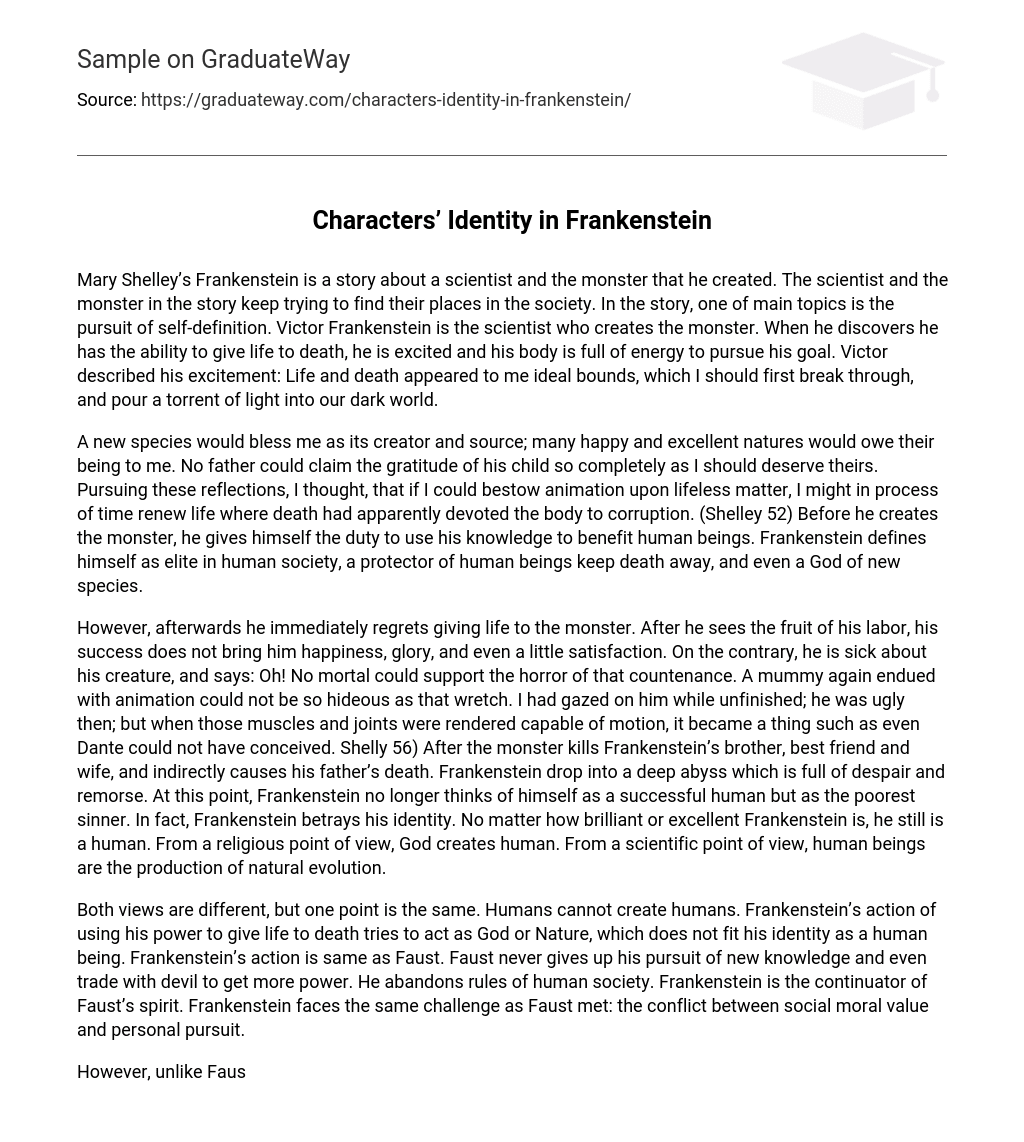Mary Shelley’s Frankenstein is a story about a scientist and the monster that he created. The scientist and the monster in the story keep trying to find their places in the society. In the story, one of main topics is the pursuit of self-definition. Victor Frankenstein is the scientist who creates the monster. When he discovers he has the ability to give life to death, he is excited and his body is full of energy to pursue his goal. Victor described his excitement: Life and death appeared to me ideal bounds, which I should first break through, and pour a torrent of light into our dark world.
A new species would bless me as its creator and source; many happy and excellent natures would owe their being to me. No father could claim the gratitude of his child so completely as I should deserve theirs. Pursuing these reflections, I thought, that if I could bestow animation upon lifeless matter, I might in process of time renew life where death had apparently devoted the body to corruption. (Shelley 52) Before he creates the monster, he gives himself the duty to use his knowledge to benefit human beings. Frankenstein defines himself as elite in human society, a protector of human beings keep death away, and even a God of new species.
However, afterwards he immediately regrets giving life to the monster. After he sees the fruit of his labor, his success does not bring him happiness, glory, and even a little satisfaction. On the contrary, he is sick about his creature, and says: Oh! No mortal could support the horror of that countenance. A mummy again endued with animation could not be so hideous as that wretch. I had gazed on him while unfinished; he was ugly then; but when those muscles and joints were rendered capable of motion, it became a thing such as even Dante could not have conceived. Shelly 56) After the monster kills Frankenstein’s brother, best friend and wife, and indirectly causes his father’s death. Frankenstein drop into a deep abyss which is full of despair and remorse. At this point, Frankenstein no longer thinks of himself as a successful human but as the poorest sinner. In fact, Frankenstein betrays his identity. No matter how brilliant or excellent Frankenstein is, he still is a human. From a religious point of view, God creates human. From a scientific point of view, human beings are the production of natural evolution.
Both views are different, but one point is the same. Humans cannot create humans. Frankenstein’s action of using his power to give life to death tries to act as God or Nature, which does not fit his identity as a human being. Frankenstein’s action is same as Faust. Faust never gives up his pursuit of new knowledge and even trade with devil to get more power. He abandons rules of human society. Frankenstein is the continuator of Faust’s spirit. Frankenstein faces the same challenge as Faust met: the conflict between social moral value and personal pursuit.
However, unlike Faust, Frankenstein realizes his experiment is wrong. When Frankenstein is dying, he says: In a fit of enthusiastic madness I created a rational creature, and was bound towards him, to assure, as far as was in my power, his happiness and well-being. This was my duty; but there was another still paramount to that. My duties towards the beings of my own species had greater claims to my attention, because they included a greater proportion of happiness of misery. (Shelley 214) This statement is the penitence of Frankenstein.
After his realization, Frankenstein’s identity changes back to being human again. The monster is the other main character in Frankenstein. Everyone thinks he is a monster, but he thinks he is a human. He wants to be a member of human society. He thinks the only difference between himself and human is his face. His face is so ugly that sometimes even scares himself. However, because of his appearance, everyone is afraid of him and tries to beat him. The monster feels despair, so he decides to get revenge on Frankenstein for the pain that Frankenstein caused him.
At the end of the book, the monster also realizes his sin. He never felt good after killing people, on contrary, he feels more pain. He says: “After the murder of Clerval I returned to Switzerland heart-broken and overcome. I pitied Frankenstein; my pity amounted to horror: I abhorred myself” (Shelley 217). In fact, besides his appearance, the monster is similar with human being. His heart is as sensitive as human’s. By describing the changing identities of Frankenstein and the monster, Mary Shelley conveys two social problems in her times.
Because the power of technology, people excessively rely on science and, sometimes, make science the new God of world. Shelley is worried that more “Frankensteins” would lose themselves in the way of pursuing their goals. The story might different, if Frankenstein didn’t lose himself. If Frankenstein didn’t cut off his connection with society, maybe he would stop his experiment; If the monster gain love and cares from human being, Maybe he would lead a happy life; If Frankenstein do his responsibility to teach the monster the right moral value, they would get along very well.





